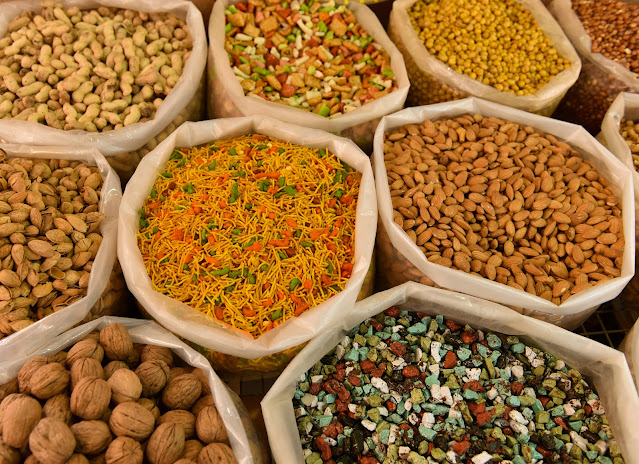Incorporating nuts into your diet is a delicious and nutritious way to boost your protein intake. These small but mighty snacks are packed with essential nutrients, healthy fats, and plant-based protein. Whether you're looking to build muscle, manage weight, or simply eat a more balanced diet, high-protein nuts can be an excellent addition to your meals and snacks. Here are eight high-protein nuts recommended by dietitians to help you achieve your nutrition goals.
1. Almonds
Protein Content: 6 grams per ounce (about 23 almonds)
Almonds are a popular choice for their versatility and health benefits. They are rich in protein, fiber, vitamin E, and magnesium. Enjoy them raw, roasted, or as almond butter spread on whole-grain toast.
Dietitian Tip: Incorporate almonds into your breakfast by adding them to oatmeal or yogurt for a protein boost that keeps you full until lunch.
2. Peanuts
Protein Content: 7 grams per ounce (about 28 peanuts)
Technically a legume, peanuts are often categorized with nuts due to their similar nutritional profile. They are an excellent source of protein, healthy fats, and various vitamins and minerals.
Dietitian Tip: Make a peanut butter smoothie by blending peanut butter with a banana, Greek yogurt, and a splash of milk for a high-protein snack.
3. Pistachios
Protein Content: 6 grams per ounce (about 49 pistachios)
Pistachios are not only high in protein but also rich in antioxidants, fiber, and healthy fats. Their slightly sweet flavor makes them a delightful addition to both savory and sweet dishes.
Dietitian Tip: Snack on pistachios in their shells to slow down your eating and enjoy mindful snacking.
4. Cashews
Protein Content: 5 grams per ounce (about 18 cashews)
Cashews are creamy and mildly sweet, making them a favorite in both raw and cooked forms. They are a good source of protein, iron, zinc, and magnesium.
Dietitian Tip: Use cashews to make a plant-based cream sauce for pasta or as a base for vegan cheese.
5. Walnuts
Protein Content: 4 grams per ounce (about 14 halves)
Walnuts are renowned for their omega-3 fatty acid content, which is beneficial for heart health. They also provide a decent amount of protein and fiber.
Dietitian Tip: Add chopped walnuts to salads or oatmeal for a crunchy, nutritious topping.
6. Hazelnuts
Protein Content: 4 grams per ounce (about 21 nuts)
Hazelnuts are packed with protein, fiber, and healthy fats. They also contain a variety of vitamins and minerals, including vitamin E and magnesium.
Dietitian Tip: Blend hazelnuts into a homemade nut butter or sprinkle them over roasted vegetables for added texture and flavor.
7. Pecans
Protein Content: 3 grams per ounce (about 19 halves)
Pecans are rich in healthy fats, antioxidants, and fiber. Although they have slightly less protein compared to other nuts, their unique flavor and nutrient profile make them a valuable addition to a balanced diet.
Dietitian Tip: Use chopped pecans in baking, such as in muffins or bread, to enhance the nutritional value of your treats.
8. Brazil Nuts
Protein Content: 4 grams per ounce (about 6 nuts)
Brazil nuts are a powerhouse of nutrition, offering protein, healthy fats, and selenium—a mineral crucial for thyroid health and antioxidant function.
Dietitian Tip: Due to their high selenium content, limit your intake to a few Brazil nuts per day to avoid excessive selenium consumption.
Incorporating High-Protein Nuts into Your Diet
Nuts can be enjoyed in various ways, making it easy to incorporate them into your daily diet:
Snacks: Enjoy a handful of mixed nuts for a quick, protein-packed snack.
Smoothies: Add nut butter or whole nuts to your smoothies for extra creaminess and protein.
Salads: Sprinkle nuts over salads to add crunch and enhance the nutrient profile.
Baking: Include nuts in your baking recipes, such as muffins, cookies, and breads, for added flavor and nutrition.
Meals: Use nuts as a topping for oatmeal, yogurt, or even stir-fries for a boost of protein and healthy fats.
Conclusion
High-protein nuts are a versatile and nutritious addition to any diet, helping you meet your protein needs while providing essential vitamins and minerals. Whether you're looking to build muscle, manage your weight, or simply enjoy a healthier lifestyle, incorporating these nuts into your meals and snacks can support your nutrition goals. As always, moderation is key, and it’s best to enjoy a variety of nuts to reap the full range of health benefits they offer.
References:
1. Harvard T.H. Chan School of Public Health. "The Nutrition Source: Nuts and Legumes."
2. American Heart Association. "Health Benefits of Nuts."
3. Mayo Clinic. "Nuts and your heart: Eating nuts for heart health."
By understanding the benefits and incorporating these high-protein nuts into your diet, you can make strides toward achieving your nutrition goals in a delicious and satisfying way.








.png)
.png)



